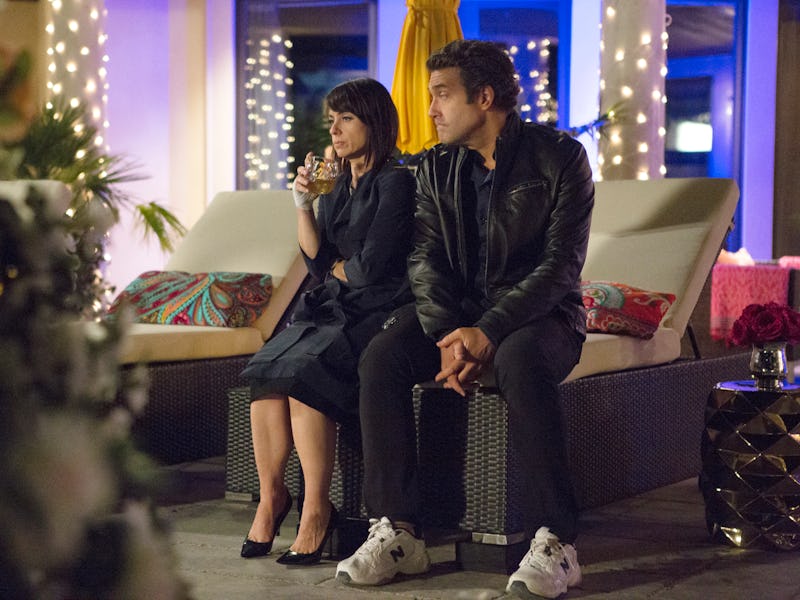In ‘UnREAL’ Season 2, A Once-Brilliant Show Became What It Mocks
How the second season of the once-beloved Lifetime show did itself in while struggling toward higher drama.

It’s really a sad tale; and in a meta kind of way, it’s all too fitting. UnREAL Season 2’s unraveling is one of the strangest and most dramatic in recent TV history. It’s rivaled only by Mr. Robots self-indulgence levels in its glacially paced, polarizing new season.
The problem with Lifetime’s first big “prestige” series is simple, really. Most specifically, a police-shooting plot like that is immediately retreated from and raked over is not going to be a good idea. This disconcerting turn-of-events threw viewers off the scent of an already-very-complicated season, in which it was already hard to know what to focus on – and whose story to care about.
This is just the most regrettable and telling symptom of a larger problem: As on the show-within-a-show, the Lifetime-industrial complex decided the stakes needed to be upped for the second season of the series — at least according to a recent New Yorker article. Despite the Peabody Award and critical acclaim, the series — the brainchild of former Bachelor producer Sarah Gertrude Shapiro and industry veteran Marti Noxon — scored modest ratings during its first season, and the powers that be were aching to secure the appropriate advancement for the second go-round.
The result of these labors was a confusing and sometimes self-contradictory ratking of plotlines. The show combines Shapiro’s pet envelope-pushing sociopolitical themes — revolving around a black suitor on Everlasting (B.J. Britt) — and new, involved romantic plot lines for leads Quinn (Constance Zimmer) and Rachel (Shiri Appleby).
As the season wore on, it became increasingly clear that one of these threads was always short-changing the other — not to mention, say, the intercession of an abuse plot line revolving around Jeremy, or Rachel’s psych-ward detainment. The pressure to give romance and racism equal screen time took the focus of a given episode in wildly incongruous, and sometimes aggressively inappropriate, directions.
The shooting of Romeo (Gentry White) — who comes back just-dandy in the finale — and the sore-thumb revelation of Rachel’s childhood rape — used only to emphasize what an asshole Coleman (Michael Rady) ended up being — were the two most misguided examples. Both felt like mere side points in the season, when it felt that they should have transfigured the direction of the plot more drastically — shocking bullet points to promote continued audience engagement.
Season 2 was not inept, as much as fundamentally misguided, and clearly at war with itself. It mirrored Everlasting in that way. The entropy of the show-within-a-show culminates in a unlikely climax in its final episode, thwarting all expectations. The producers surprise Darius and potential brides Tiffany (Kim Matula) and Chantal (Meagan Tandy) with a potential double wedding. More than ever before on the show, the invisible, God-like hand of the production team (in this case, largely Quinn) reveals itself, in a way that reality TV is supposed to obscure. Yet, for some reason — before Rachel and Jay’s sabotage — Quinn thinks it’s a successful episode; part of this is supposed to relate to her broken view of “true love” following the implosion of her most recent romantic relationship. Fuck “wifey”s: All of a sudden, the show is all about people shitting their pants, and heartbreak, across the board.
Everlasting’s conclusion is a good metaphor for the season, embedded unwittingly in the show: While chasing ratings, the show loses sense of its purpose and guidelines, despite its happy ending. UnREAL remains a fascinating portrait of a nightmarish, codependent work environment that no one involved can ever properly extracted from. At the end of the season finale, its most “damaged” veterans — Rachel, Quinn, Jeremy (Josh Kelly), and Chet (Craig Bierko)— recline, alone on-set, contemplating the enormity of their latest dastardly act. As always, it was done, supposedly, in the service of Everlasting.
UnREAL has stumbled in its own bumrush for ratings. Many critics have criticized the show’s convoluted, sometimes-irresponsible direction this season, and weekly viewership has sunk across the duration of the season, though the season average was double that of Season 1.
In a way; its problematic disorder feels like the malaise of having too many Chrome tabs open, dramatized. It tackles too many hot-button-issues, cursorily, all at once. The show’s mad, discomfiting energy is driven by the tension between a panoply of half-baked but attention-grabbing plot threads.
“Interesting,” for UnREAL, no longer means “good,” however. One wonders whether the Season 3 greenlight — which occurred before the premiere of Season 2, and doubtless affected the bold open-endedness of the finale — was really a good idea. Did a season this confusing — not to mention sporadically offensive — manage to build, or even retain, UnREAL’s fan base? Perhaps, as for Quinn in Everlasting, the sheer amount of drama was enough, and the unsettling loose ends will eventually fade, as they were meant to.